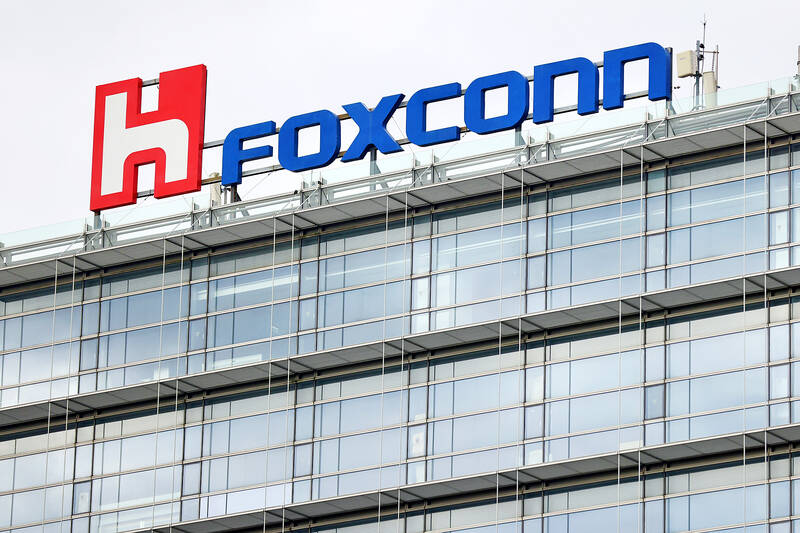Hon Hai Precision Industry Co (鴻海精密), also known as Foxconn Technology Group (富士康科技集團) internationally, on Wednesday announced a semiconductor packaging and testing service joint venture with India’s HCL Group.
The iPhone assembler said in a statement that its subsidiary Foxconn Hon Hai Technology India Mega Development Private Ltd has teamed up with HCL to set up a semiconductor joint venture in India.
By investing US$37.20 million, the subsidiary secured a 40 percent stake in the outsourced semiconductor assembly and test (OSAT) joint venture, which has set its sights on India’s semiconductor market, it said.

Photo: EPA-EFE
An OSAT service provider packages, assembles and tests wafers made by pure-play wafer foundry operators, turning them into finished semiconductor chips.
Through its investment, Hon Hai said it is looking forward to working with HCL, one of India’s leading software and engineering firms, to establish a semiconductor ecosystem and expects that cooperation would enhance supply chain resilience in the South Asian country.
Hon Hai said it would continue a build-operate-localize (BOL) business model to support Indian communities.
A report from the business news outlet Mint cited industry insiders as saying that HCL has had semiconductor design and testing software expertise for a long time, and following its existing partnerships with several leading chipmakers, a partnership with Hon Hai made sense for both sides.
In July last year, Hon Hai announced it would be pulling out of a US$19.5 billion joint venture with Indian conglomerate Vedanta Group to make semiconductors in India. Indian media reports said that the breakup might have been caused by the slow pace at which the joint venture was proceeding.
The reports said the project was hindered by a lack of technical partners and because the Indian government had required that the joint venture resubmit applications for awards and subsidies.
While the cooperation with Vedanta fell apart, Hon Hai chairman Young Liu (劉揚偉) told investors in November last year that the company would continue to push for semiconductor investments in India through the BOL business model.

Vincent Wei led fellow Singaporean farmers around an empty Malaysian plot, laying out plans for a greenhouse and rows of leafy vegetables. What he pitched was not just space for crops, but a lifeline for growers struggling to make ends meet in a city-state with high prices and little vacant land. The future agriculture hub is part of a joint special economic zone launched last year by the two neighbors, expected to cost US$123 million and produce 10,000 tonnes of fresh produce annually. It is attracting Singaporean farmers with promises of cheaper land, labor and energy just over the border.

US actor Matthew McConaughey has filed recordings of his image and voice with US patent authorities to protect them from unauthorized usage by artificial intelligence (AI) platforms, a representative said earlier this week. Several video clips and audio recordings were registered by the commercial arm of the Just Keep Livin’ Foundation, a non-profit created by the Oscar-winning actor and his wife, Camila, according to the US Patent and Trademark Office database. Many artists are increasingly concerned about the uncontrolled use of their image via generative AI since the rollout of ChatGPT and other AI-powered tools. Several US states have adopted

A proposed billionaires’ tax in California has ignited a political uproar in Silicon Valley, with tech titans threatening to leave the state while California Governor Gavin Newsom of the Democratic Party maneuvers to defeat a levy that he fears would lead to an exodus of wealth. A technology mecca, California has more billionaires than any other US state — a few hundred, by some estimates. About half its personal income tax revenue, a financial backbone in the nearly US$350 billion budget, comes from the top 1 percent of earners. A large healthcare union is attempting to place a proposal before

KEEPING UP: The acquisition of a cleanroom in Taiwan would enable Micron to increase production in a market where demand continues to outpace supply, a Micron official said Micron Technology Inc has signed a letter of intent to buy a fabrication site in Taiwan from Powerchip Semiconductor Manufacturing Corp (力積電) for US$1.8 billion to expand its production of memory chips. Micron would take control of the P5 site in Miaoli County’s Tongluo Township (銅鑼) and plans to ramp up DRAM production in phases after the transaction closes in the second quarter, the company said in a statement on Saturday. The acquisition includes an existing 12 inch fab cleanroom of 27,871m2 and would further position Micron to address growing global demand for memory solutions, the company said. Micron expects the transaction to